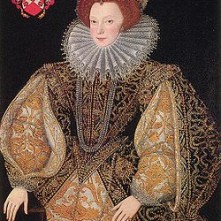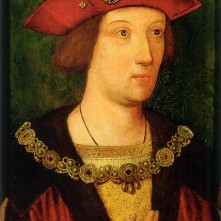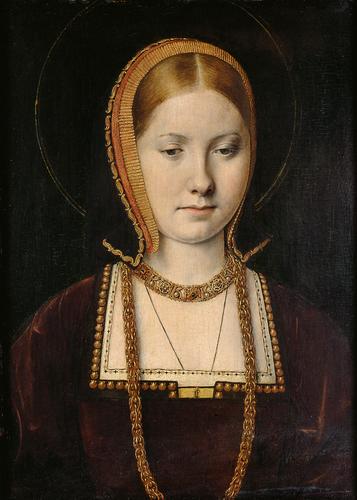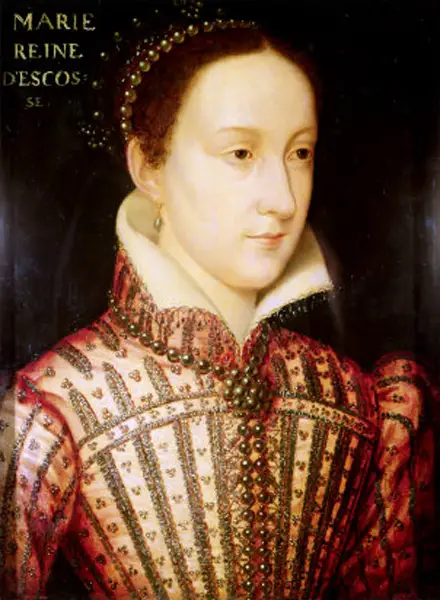17 September
1558 – Death of Walter Devereux, 1st Viscount Hereford, at the Devereux seat at Chartley in Staffordshire. He was buried in Stowe church. Devereux served Henry VIII as joint Constable of Warwick Castle, as a member of the jury at the trial of Edward Stafford, Duke of Buckingham, in 1521, in the government of the Welsh Marches, as Steward in Princess Mary's household at Ludlow and Chamberlain of the Court of General Surveyors. He also served Edward VI as a Privy Councillor.
1563 – Death of Henry Manners, 2nd Earl of Rutland, courtier and soldier, during an outbreak of the plague. He was buried at Bottesford parish church in Leicestershire. Manners served Edward VI as Warden of the East and Middle Marches on the Scottish borders, joint Lord Lieutenant of Lincolnshire and Nottinghamshire, and Lord Lieutenant of Nottinghamshire. He was imprisoned when Mary I came to the throne for his support of John Dudley, Duke of Northumberland, but was released into house arrest and then pardoned. He served Mary I as Captain-General of Horsemen and Lieutenant and Captain-General in Calais. During Elizabeth I's reign, he served as Lord Lieutenant of Nottinghamshire and Rutland, and President of the Council of the North.
1575 – Death of Heinrich (Henry) Bullinger, the Swiss reformer and theologian, in Zurich. Bullinger succeeded Huldrych Zwingli as pastor at Grossmünster and head of the church in Zurich. His main work was “The Decades”, a theological work, but his sermons were also translated and published, and he wrote historical works.
1577 - The Edict of Poitiers ratified the Treaty of Bergerac, which had been signed between Henry III of France and the Huguenot princes.
18 September
1501 – Birth of Henry Stafford, 10th Baron Stafford, at Penshurst in Kent. He was the son of Edward Stafford, 3rd Duke of Buckingham, and his wife Eleanor (née Percy), daughter of Henry Percy, 4th Earl of Northumberland. Henry married Ursula Pole, daughter of Sir Richard Pole and Margaret Pole, Countess of Salisbury, in 1519, and the couple had around fourteen children. Stafford served Mary I as a Chamberlain of the Exchequer and Elizabeth I as a Lord Lieutenant of Staffordshire.
1535 – Birth of Henry Brandon, son of Charles Brandon, Duke of Suffolk, and his wife Katherine (née Willoughby). Henry Brandon died on 14th July 1551, at the age of fifteen, from sweating sickness. His younger brother, Charles, survived him by just half an hour.
1544 – Henry VIII rode triumphantly through the streets of Boulogne after the French surrendered, ending the Siege of Boulogne. Click here to read more.
1556 – Death of Edward Courtenay, 1st Earl of Devon, from a fever at Padua in Italy. He was buried there in the church of Sant'Antonio. Courtenay had been sent overseas after he was implicated in Wyatt's Rebellion as a future husband and consort of Mary I's half-sister, Elizabeth.
1559 – The fifteen-year-old Francis II was crowned King of France at Rheims by the Cardinal of Lorraine, following the death of his father Henry II in July 1559 after a jousting accident. Mary, Queen of Scots was Francis' consort.
19 September
1551 – Birth of Henry III of France. He was born at the Château de Fontainebleau, and was the fourth son of King Henry II and Catherine de' Medici. He was King of France from 1574 to 1589, succeeding his brother, Charles IX.
1555 – Burnings of Protestant martyrs, Robert Glover and Cornelius Bungey, at Coventry. John Foxe gives the date of their burnings as “about the 20th day” in his “Actes and Monuments” (1563), but Rev. Thomas Brice gives the date as the 19th in his “A Compendious Regester” of 1559. Foxe actually used Brice's “Regester” as a source.
1560 – Baptism of Thomas Cavendish, explorer, navigator and privateer, at St Martin's Church, Trimley St Martin, Suffolk. Cavendish is known for his imitation of Sir Francis Drake's circumnavigation of the globe, which he undertook in 1586, and for being the first Englishman to explore the island of St Helena, in the mid-Atlantic.
1580 - Death of Katherine Bertie (née Willoughby and previous married name Brandon) after a long illness. She was buried in Spilsby church, Lincolnshire. Click here to read more about her.
20 September
1486 - Birth of Arthur, Prince of Wales, son of Henry VII and Elizabeth of York, at Winchester. Click here to read more about Arthur.
1554 – Death of Sir William Paston, courtier and landowner, at Paston. He was buried there. Paston served Henry VIII as a Sheriff and Commissioner, and was also chosen to welcome Anne of Cleves to court in January 1540.
1586 – Executions of Anthony Babington, John Ballard, John Savage, Chidiock Tichborne and three other conspirators near St Giles-in-the-Fields in London. They were hanged, drawn and quartered for plotting to assassinate Queen Elizabeth I in the famous Babington Plot in support of Mary, Queen of Scots. A further seven were executed the following day.
1596 – Death of William Day, Bishop of Winchester.
21 September
 1550 – Death of William Rugg (Repps), Bishop of Norwich. He was buried at the cathedral there. Rugg supported Henry VIII's quest for an annulment of his marriage to Catherine of Aragon and his subsequent supremacy, but his conservativism in other areas caused conflict between him, Thomas Cromwell and Thomas Cranmer. Rugg resigned his episcopate in January 1550 in return for pardons for his alleged support of the rebels in Kett's Rebellion.
1550 – Death of William Rugg (Repps), Bishop of Norwich. He was buried at the cathedral there. Rugg supported Henry VIII's quest for an annulment of his marriage to Catherine of Aragon and his subsequent supremacy, but his conservativism in other areas caused conflict between him, Thomas Cromwell and Thomas Cranmer. Rugg resigned his episcopate in January 1550 in return for pardons for his alleged support of the rebels in Kett's Rebellion.
1557 – Burial of Henry Pendleton, theologian, chaplain and friend of Bishop Bonner, at St Stephen Walbrook, London. Pendleton is known for his changing religious beliefs: he was against Lutheranism in Henry VIII's reign, supported Protestantism in Edward VI's reign and then converted back to Catholicism in Mary I's reign.
1558 - Death of Charles V, former Holy Roman Emperor, from malaria at the monastery of Yuste in the Extremadura region of Spain. He had previously been suffering from debilitating attacks of gout which had necessitated him being carried around in a chair. Charles was buried at the monastery church, but later moved to the Royal Pantheon of El Escorial, the Royal Palace at San Lorenzo de El Escorial near Madrid.
1578 - Marriage of Robert Dudley, Earl of Leicester, and Lettice Devereux (née Knollys) widow of Walter Devereux, Earl of Essex, at Leicester's house in Wanstead, Essex. The marriage was low-key because Leicester had not told Elizabeth I of his relationship with Lettice.
1579 – Burial of Sir Edward Fitton, president of Connacht and Thomond, Vice-Treasurer and Treasurer-at-Wars during Elizabeth I's reign. He was buried beside his wife, Anne, at St Patrick's Cathedral in Dublin, Ireland.
22 September
1515 - Birth of Anna von Jülich-Kleve-Berg, or Anne of Cleves, fourth wife of Henry VIII, near Düsseldorf. Click here to read more and click here to see our Anne of Cleves archive.
1544 – Death of James Nedeham, architect, while accompanying King Henry VIII to Boulogne. He was buried in Boulogne at the church of Our Lady, and a monument was erected to him at the church in Little Wymondley, Hertfordshire. Nedeham worked for Cardinal Wolsey on York Place, and then for the King on Hampton Court Palace, the Jewel House at the Tower of London and St Augustine's in Canterbury.
1557 – Death of Robert Steward, Prior and Dean of Ely, at Ely. He was buried in Ely Cathedral.
1557 – Death of Robert Warton, Bishop of Hereford. He was buried in Hereford Cathedral, in the north-east transept.
1560 – Burial of Amy Dudley (née Robsart), wife of Robert Dudley, Earl of Leicester, at St Mary's, Oxford.
1610 – Burial of Puritan politician and author Sir Francis Hastings at North Cadbury Church in Somerset, next to his wife. Hastings was a member of Parliament and Sheriff in Leicestershire during Elizabeth I's reign, and is known for his Puritan pamphlets, which included “A Watch-Word to All Religious, and True Hearted English-Men”.
23 September
1568 – Battle of San Juan de Ulúa, near present day Veracruz, Mexico, between Spanish forces and English privateers led by John Hawkins. The Spanish forces were victorious.
1571 - Forty-nine year-old Bishop of Salisbury, Bishop John Jewel, died at Monkton Farleigh Manor after being taken ill while preaching a sermon in Lac*ck. He was laid to rest in Salisbury Cathedral.
1605 – Burial of William Averell, pamphleteer, at St Peter's Cornhill. Averill's works included the romantic “An excellent historie, both pithy and pleasant, on the life and death of Charles and Julia, two Brittish, or rather Welsh lovers” (1581), the Protestant “A wonderfull and straunge newes, which happened in the county of Suffolke, and Essex, the first of February, being Friday, where in rayned wheat, the space of vi or vii miles compass” (1583), a collection of moral narrative “A Dyall for Dainty Darlings” (1584) and “A Mervalious Combat of Contrarieties” (1588).








Leave a Reply